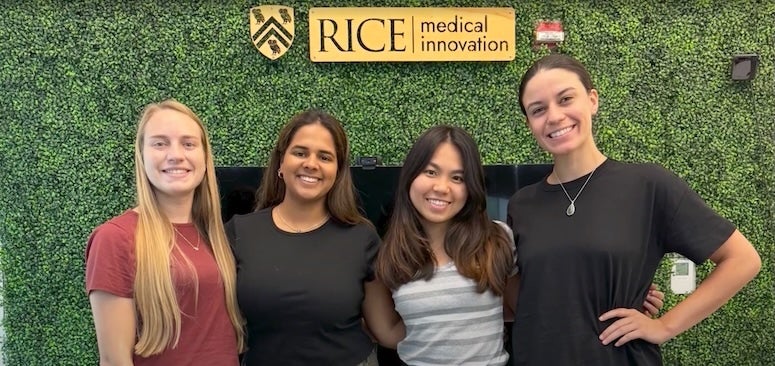
Two student teams from Rice University have been named finalists in the 2025 Collegiate Inventors Competition, a program by the National Inventors Hall of Fame that recognizes the next generation of innovators whose work has the potential to improve lives and drive the future of American technology.
The Rice teams — VacuTrac and The Dual-Sided Tag Applier — will present their inventions Oct. 16 to a panel of judges that includes National Inventors Hall of Fame inductees and United States Patent and Trademark Office (USPTO) officials. Winners will be announced the same day.
Tackling inefficiency in spinal surgery: VacuTrac
Each year, more than 300,000 Americans undergo spinal fusion surgery, a procedure that requires exposing the spine in a long, risky and sometimes inefficient process. To streamline the operation, Rice bioengineering and mechanical engineering students designed VacuTrac, a device that combines the functions of multiple surgical tools into a single, user-friendly platform.
By allowing two surgeons to work simultaneously on both sides of the spine, VacuTrac reduces the time needed to expose the spine while increasing surgical efficiency and precision.
The VacuTrac team includes Cameron Erber, Yeonju Kim and Sophianne Loh, recent graduates in bioengineering; Luke Yuen, a recent graduate in mechanical engineering; and Sabia Abidi, assistant teaching professor of bioengineering and the team’s adviser.
Improving cancer outcomes: Dual-Sided Tag Applier (DSTA)
Soft tissue sarcomas are aggressive cancers with a high recurrence rate of 50%. Current methods for marking tumor margins during surgery are imprecise, inconsistent and nonstandardized, often leading to miscommunication between pathology and oncology teams and complicating treatment decisions.
The Rice team’s DSTA is a medical device that simultaneously labels tumors and marks the tumor bed during surgery. This innovation enables accurate marking of tumor margins at the point of resection, helping oncologists and pathologists better manage recurrence and improve patient outcomes.
The DSTA team includes Alexandra McLennan, a Master of Bioengineering candidate in the Global Medical Innovation program; Jade Lee and Ishika Mukherjee, Master of Bioengineering graduates in the Global Medical Innovation program; Amanda Hudson, a Master of Bioengineering candidate; and orthopedic oncologist Justin Bird, who serves as the team’s adviser.
For 35 years, the Collegiate Inventors Competition has celebrated university students and their faculty advisers who push the boundaries of discovery. Sponsored by the USPTO and organized by the National Inventors Hall of Fame, the competition provides exposure, mentorship and resources to bring promising ideas closer to market.
“The USPTO is proud to be the host and presenting sponsor for the 2025 Collegiate Inventors Competition — a program where the brightest college minds in our country showcase the ideas and inventions that will shape our future,” said John Squires, under secretary of commerce for intellectual property and director of the USPTO. “We are pleased to meet the finalists as they gain valuable exposure for their ideas, receive guidance and feedback from world-changing inventors and see their hard work rewarded. As these young inventors and entrepreneurs strive to patent their inventions and bring them to market, they represent the promise of our nation’s intellectual property system and the growth of our innovation economy. Innovation is ageless.”
More than 500 innovators have participated in the competition since its founding in 1990, and more than $1 million in support has been awarded to winning teams.

